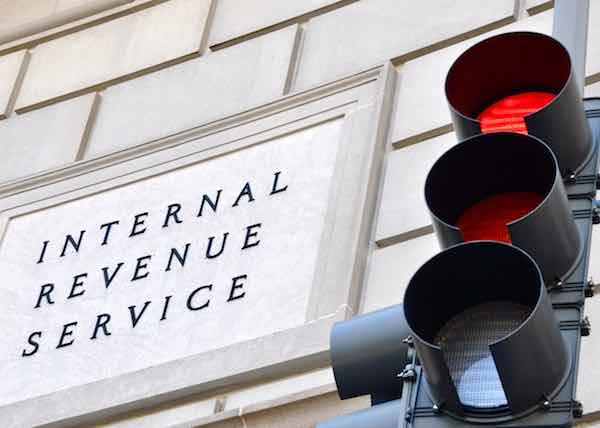The Internal Revenue Service announced today that it is ending most unannounced visits by IRS agents to taxpayers’ homes. The agency says that the change is intended “reduce public confusion and enhance overall safety measures for taxpayers and employees.”
Despite having had a policy in place for decades that allowed IRS agents to go to taxpayers’ homes without warning, the agency said that agents were increasingly encountering hazards and uncertainty when making unannounced visits to taxpayers’ homes to resolve delinquent tax problems.
Due to a rise in scams, sometimes scammers would go to taxpayers’ homes posing as IRS agents. This created confusion not just for taxpayers but for local police as well.
“These visits created extra anxiety for taxpayers already wary of potential scam artists,” IRS Commissioner Danny Werfel said. “At the same time, the uncertainty around what IRS employees faced when visiting these homes created stress for them as well. This is the right thing to do and the right time to end it.”
Despite the change, Werfel said that the agency will have the resources it needs to ensure taxpayer compliance. The Inflation Reduction Act (H.R. 5376) added nearly $80 billion worth of funding for the IRS, over half of which goes to enforcement activities, such as hiring more enforcement agents.
“We have the tools we need to successfully collect revenue without adding stress with unannounced visits,” Werfel said. “The only losers with this change in policy are scammers posing as the IRS.”
Reports of Bizarre Incidents Involving IRS Agents’ Visits to Taxpayers’ Homes
The announcement from the IRS comes not long after reports of suspicious situations involving IRS agents making unannounced visits to taxpayers’ homes.
Congressman Jim Jordan (R-OH) announced last month that he was investigating an incident in which an IRS agent used a fake name to target an Ohio taxpayer at her home.
According to Jordan, an IRS agent who identified himself as “Bill Haus” of the IRS Criminal Division went to a woman’s home in Marion, OH. He said he was there to discuss issues about an estate of which she was a fiduciary. He said that she did not properly complete the filings for the estate and owed the IRS “a substantial amount.”
The woman allowed him to enter her home at which point he said that the real purpose of his visit was not about a problem with the estate but because the decedent had several delinquent tax return filings. He then provided several documents for her to fill out which included sensitive information about the decedent.
The taxpayer called her attorney who told “Haus” to leave. He responded aggressively, insisting, “I am an IRS agent, I can be at and go into anyone’s house at any time I want to be.”
The police ended up getting involved and believed the woman was being scammed. They told the IRS agent not to return to her house or he would be arrested. The agent filed a complaint against the police department over the situation.
Even more surprisingly, the supervisor for Agent “Haus” said that no taxes were owed.
Additionally, Jordan sent a letter to IRS Commissioner Danny Werfel raising questions about the timing and circumstances of one of the agency’s unannounced visits to journalist Matthew Taibbi’s house that took place during a hearing held in Congress investigating the Twitter Files. Taibbi was one of the witnesses providing testimony at the hearing.
“The circumstances surrounding the IRS’s unannounced and unprompted visit to Mr. Taibbi’s home, at the exact time that he was testifying to Congress about ‘the most serious’ government abuse he has witnessed in his career as a journalist, are incredible,” wrote Jordan.
Not surprisingly, Jordan celebrated today’s announcement from the IRS to end unannounced visits to taxpayers’ homes. He wrote in a tweet, “Another win thanks to the hard oversight work of @JudiciaryGOP and @Weaponization.”
Taibbi tweeted, “…thanks so much to @JudiciaryGOP for following through with this issue. Nobody should have to worry about getting a surprise visit from the IRS.”
Some are blaming Republicans for creating some of the more recent confusion and safety issues cited by the IRS.
The Washington Post wrote, “…recent rhetoric from Republicans opposed to last year’s increase in IRS funding has raised more concerns about agents showing up announced on citizens’ doorsteps. While the revenue agents who historically did the door-knocking never carried guns, some Republicans have falsely claimed the agency was spending billions to hire thousands of gun-toting officers to collect people’s taxes.”
The New York Times wrote:
The agency [IRS] has been trying to project a more customer-focused approach to taxpayers while Republicans have been fanning fears that the tax collector is hiring an army of 87,000 new agents to shake down small businesses and the middle class. The antipathy toward the I.R.S. has made the work of its agents more dangerous; last year, the agency initiated a comprehensive security review after misinformation and false postings on social media led to threats directed at employees.
What Happens Going Forward?
The IRS said that instead of unannounced home visits to taxpayers, letters will be sent to schedule appointments.
IRS employees will initiate contact with taxpayers through an appointment letter, known as a 725-B, and schedule a follow-up meeting. The agency said that this will help taxpayers feel more prepared when it is time to meet.
However, the IRS has not ended unannounced home visits entirely. The agency said there are some limited situations in which they may still occur. These include the service of summonses and subpoenas and sensitive enforcement activities involving the seizure of assets, especially those at risk of being placed beyond the reach of the government. The IRS said that these types of cases are “less than a few hundred each year” versus “tens of thousands” of unannounced visits that were taking place annually under the old policy.




